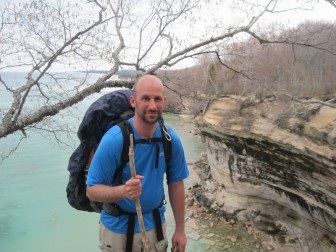
Mike Shriberg hiking at Michigan’s Pictured Rocks.
By Colleen Otte
Most Great Lakes visitors enjoy activities like swimming and fishing, and the new executive director of the National Wildlife Federation’s Great Lakes Regional Center is no exception.
But Mike Shriberg believes the lakes should be viewed as much more than an escape to paradise. They are the “economic drivers” and “social glue” of the region, said Shriberg, whose appointment is effective today.
“The Great Lakes help drive culture,” Shriberg said, “but they can easily slip into ‘nice to visit’ instead of core to economics and every facet of the region.”
With that in mind, Shriberg said he is concerned that the most difficult task in his new position will be keeping the Great Lakes in the minds of decision makers.
“I think the biggest challenge will be translating the support from those who use [the lakes] — hunters, fishers, boaters, and so many more — to political support and power,” he said.
Shriberg said he is committed to playing this pivotal role between on-ground matters and decision makers.
“We’ll be working a lot more with local habitat and conservation issues,” he said. “I want to bolster and support these to raise them to the national level. We’ll be working at the grassroots and grass-top level.”
For example, the Obama administration recently suggested a $50 million cut to the Great Lakes Restoration Initiative for 2016. Shriberg said he will fight to maintain the program’s full funding of $300 million. He said he will travel to Washington, D.C. Feb. 25-26 for “Great Lakes Days,” an event in which advocates meet with Congress to promote Great Lakes initiatives.
Such funding can be used to address both emerging and reemerging threats, Shriberg said. He cited Lake Erie’s dead zones, areas that cannot adequately support life due to a lack of oxygen caused by pollution, as one reemerging threat. Issues like this and the Asian carp invasion illuminate the challenges of the region, he said.
Shriberg’s other priorities include keeping more land available for recreation, assessing the impacts of climate change on recreation and determining how best to mitigate those impacts, he said.
Shriberg said he enjoys camping, backpacking, kayaking and boating of any sort. His favorite places in the world are Isle Royale, Pictured Rocks and the Sleeping Bear Sand Dunes.
Much of his passion for the region’s issues stems from his wish that his 9-year-old and 6-year-old daughters will have the same opportunities to enjoy the Great Lakes as he had growing up in Ohio, he said.
“My love for the outdoors and for my family are a deep source of dedication,” Shriberg said.
Andy Buchsbaum, the former executive director of the Great Lakes Regional Center, said Shriberg will be a huge asset to the Great Lakes community.
“He is very knowledgeable about the Great Lakes, energy, climate change and inspiring the next generation of conservation stewards,” Buchsbaum said. “He’s an excellent leader and motivator.”
Buchsbaum served as the Ann Arbor, Michigan-based center’s director for 11 years, before he was named the federation’s nationwide vice president of conservation action in November.
Shriberg leaves his position as education director of the Graham Sustainability Institute at the University of Michigan, his alma mater, to take on his new responsibilities. . He worked with the Graham Sustainability Institute for six years, gaining a deep understanding of how the natural and social sciences relate to environmental protection when he taught a University of Michigan sustainability class, Institute Director Donald Scavia said.
“He’ll be able to bring together different disciplines,” Scavia said. “He has a very even-handed approach to advocacy.”
Shriberg looks forward to putting this skill to use once again.
“I’ve been in the education scene empowering others for a few years,” he said. “To come back to advocating the Great Lakes full-time is a pleasure.”